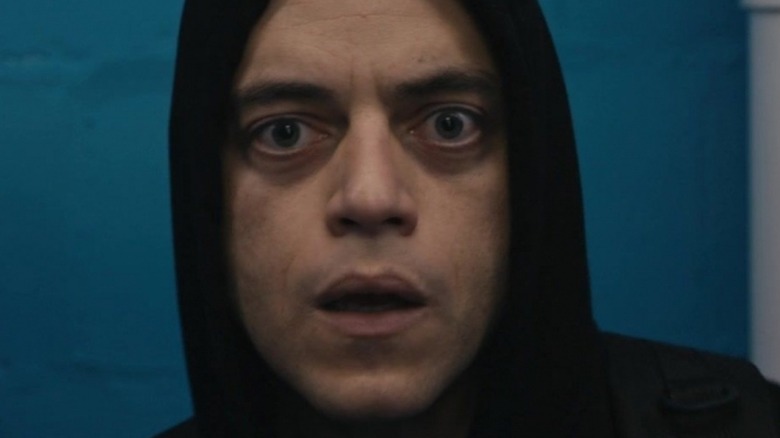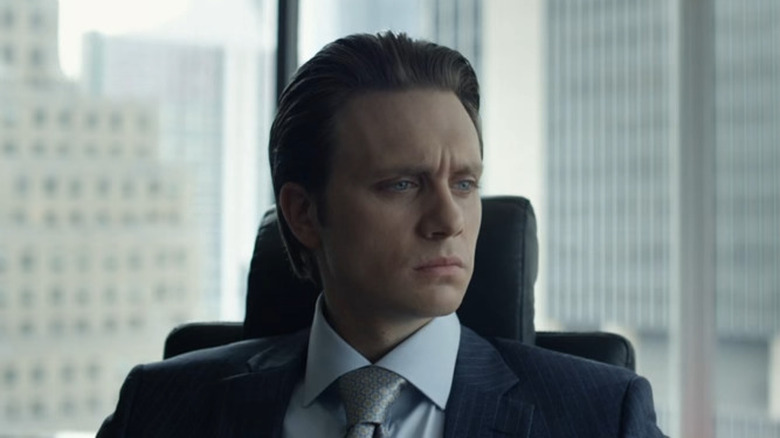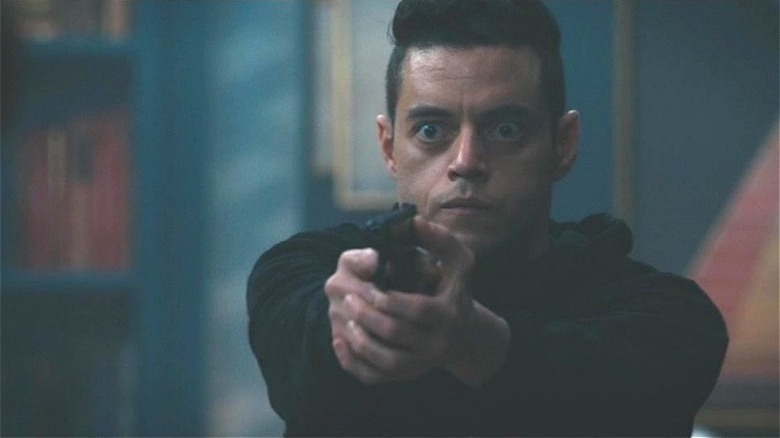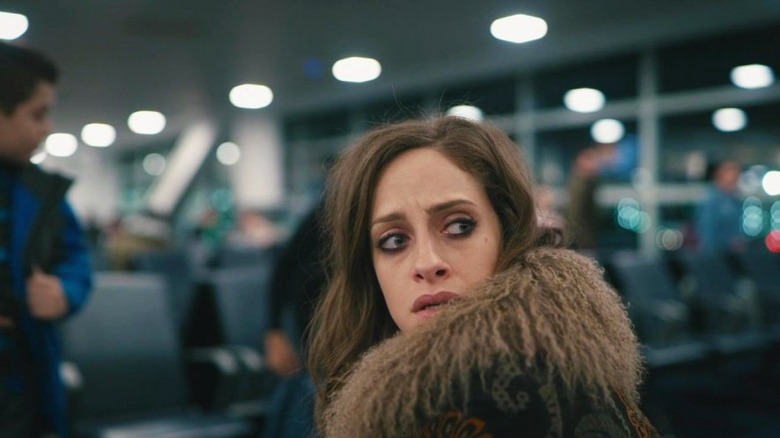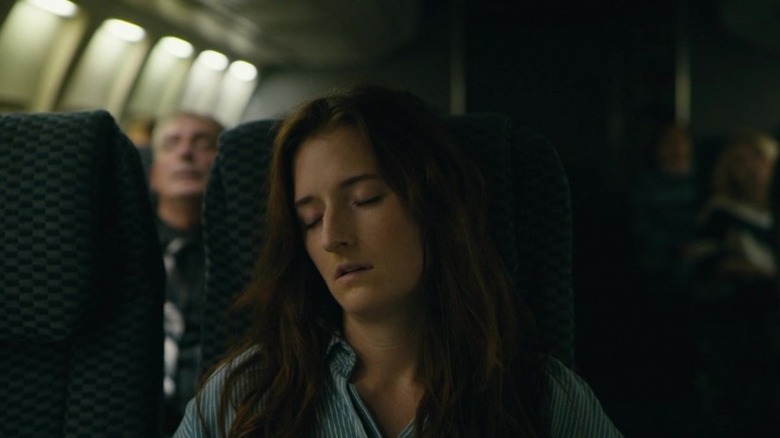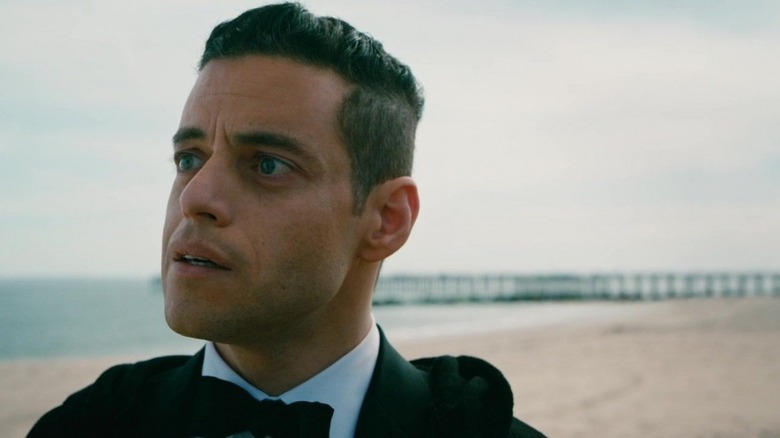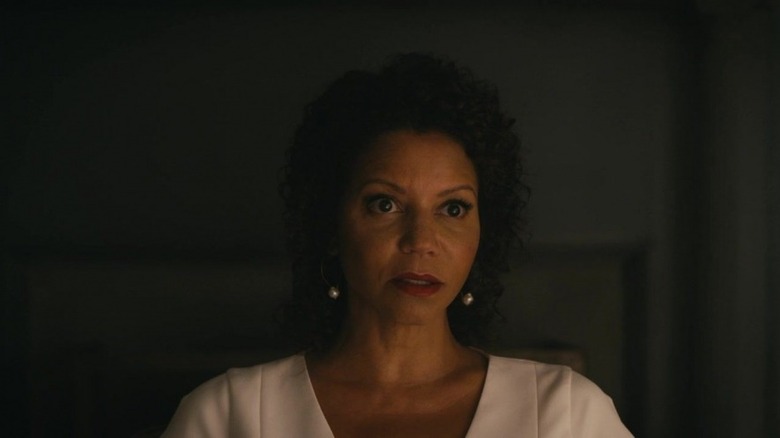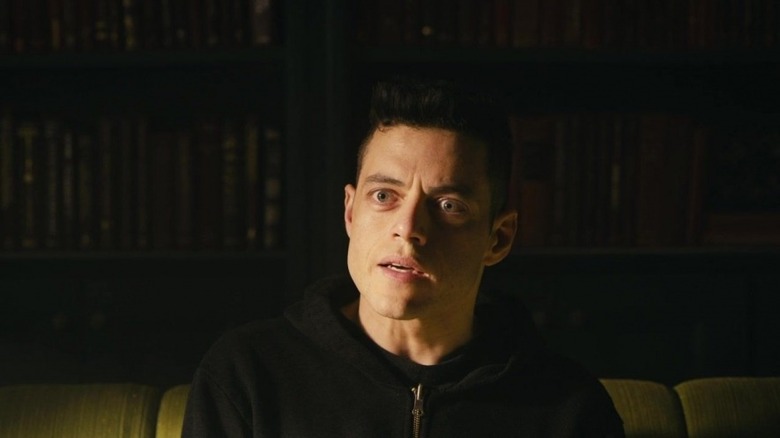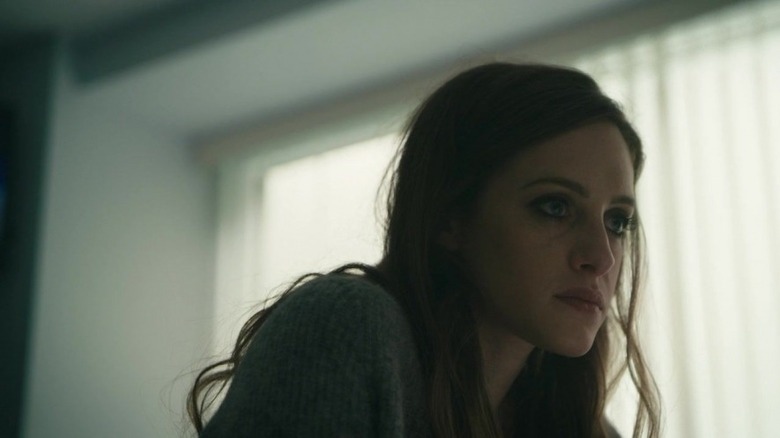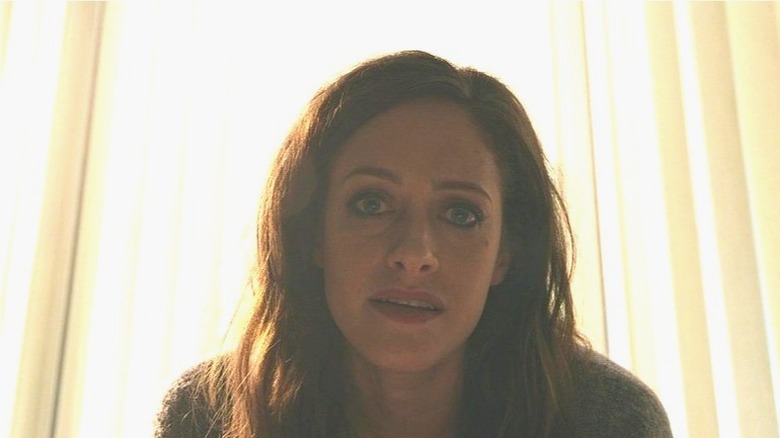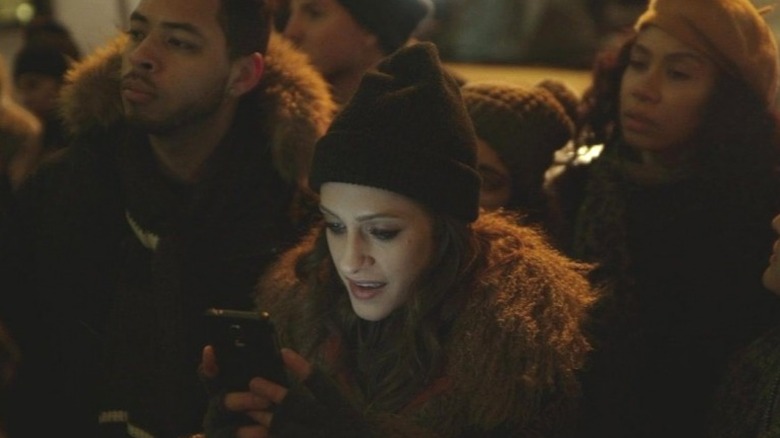The Ending Of Mr. Robot Finally Explained
There's nothing else on TV quite like "Mr. Robot" – a hero's journey that's as much about finding yourself as it is about taking down "The Man." Rami Malek plays Elliot Alderson, a reclusive hacker who works for a tech company. Elliot teams up with a group of like-minded individuals to create "fsociety" — an underground group using technology to take down the capitalist overlords. The leader of the group is Mr. Robot (Christian Slater) — a mysterious figure whose true identity becomes a major plot point in the show. Elliot's sister, Darlene (Carly Chaikin), is also a talented hacker, and she joins Elliot in his quest to make the world a better place. Apart from Darlene, Elliot's only confidant is his childhood best friend, Angela (Portia Doubleday) — who also becomes embroiled in Elliot and Darlene's dangerous plot.
On the surface, "Mr. Robot" is about a group of hackers, but underneath it's about healing from trauma. Elliot spends much of the series struggling with his mental health as a result of childhood trauma — leading to a truly shocking series finale that changes the meaning of the entire show. Though it was widely celebrated, the conclusion of "Mr. Robot" can be a little hard to swallow — and even harder to understand. If you're still confused, we're here to help you discover what really went down.
The ghost of Angela Moss
One of the most upsetting moments in the final season of "Mr. Robot" came at the very beginning. Angela Moss has one of the most upsetting storylines in the series, and the conclusion of her narrative is depressingly anticlimactic. The latter part of Season 3 saw Angela in a dark place after realizing she unknowingly helped Whiterose (BD Wong) carry out devastating terrorist attacks. Whiterose even gave her the chance to forget everything she'd seen and move on with her life, but she refused. Because of this foolish decision, Angela is killed just five minutes into the Season 4 premiere. Angela doesn't get a chance to redeem herself, nor do Elliot or Darlene get any sense of closure from their friend's death.
This lack of closure is exactly what makes Angela's death such a powerful tool for Whiterose, and both Elliot and the audience desperately wish there was a way Angela could come back to life. It's this desire that allows Whiterose to manipulate Elliot into believing her alternate reality could come to fruition — and that Angela would be alive in it. One of the overarching themes of "Mr. Robot" is the idea of letting go — and the inability of these characters to do so — and Angela's death is one of the hardest things for Elliot to accept. Even when she's not alive, Angela continues to play an important part in the finale.
The end of Tyrell Wellick
In the fourth episode of the season — "404 Not Found" — we say goodbye to another central character: Tyrell Wellick (Martin Wallström). The episode takes place on Christmas eve and sees Tyrell and Elliot wandering through the snowy woods trying to evade the Dark Army. They're alone in the woods except for a strange, ominous sound that showrunner Sam Esmail calls "the howl of death" (via The Hollywood Reporter) — a sign of things to come.
Eventually, a Dark Army agent catches up with them on the side of the road and shoots Tyrell, but not Elliot. Knowing Elliot won't have much time if the Dark Army discovers his body, Tyrell wanders off into the woods to die. Tyrell's death comes several months after the death of his wife, Joanna (Stephanie Corneliussen) — which resulted in their newborn child being placed in foster care.
Martin Wallström explained to The Hollywood Reporter that the reason the episode is so important is that "we get the missing piece of why Tyrell is so in love with Elliot: It's that he just doesn't care" — meaning he represents the freedom Tyrell wants. Tyrell's death certainly provides a sense of closure for the character — more so than Angela's did — as he finally gets to have a heroic moment. It also allows the season to move on to what is truly the central love story of the series: The relationship between Elliot and Darlene.
Elliot finally learns the truth about his past
There are many technically stunning episodes of "Mr. Robot," but few top the Season 4 episode, "407 Proxy Authentication Required." The beautifully staged episode takes place almost entirely in just two rooms and is structured like a five-act play. The episode follows four characters: Elliot, Mr. Robot, Elliot's therapist, Krista (Gloria Reuben), and drug dealer Fernando Vera (Elliot Villar). Vera wants Elliot to help him amp up his drug business, and he uses Krista as leverage.
Along with trying to convince Elliot to join him in his business venture, Vera also has a rather sadistic desire to uncover the root of Elliot's emotional distress. He forces Krista to perform a highly unethical therapy session with Elliot, taking him back to the mysterious moment he always comes back to — the day he fell out of a window. Mr. Robot — who maintains he was created to protect Elliot — tries to stop Elliot from uncovering the truth, but his power is waning.
What Elliot learns here is the most important revelation of the series thus far. Rather than being pushed out the window, he jumped to escape his father, who had been sexually abusing him for years. The alter ego of Mr. Robot emerged to prevent Elliot from remembering this horrific trauma. This epiphany shakes up Elliot and lays the groundwork for the finale — in which the truth about Elliot's fractured mind is finally revealed.
If you or someone you know may be the victim of child abuse, please contact the Childhelp National Child Abuse Hotline at 1-800-4-A-Child (1-800-422-4453) or contact their live chat services.
Darlene resists the urge to run away
Elliot may be the main character of "Mr. Robot," but Darlene is just as important to the story. Thankfully, Season 4 gave Darlene and Elliot a chance to work on their relationship and allowed Darlene the space to grow as a person. Normally, when things get tough for Darlene, she runs away. She ran away because she was too young and scared to help Elliot with his trauma, and she tends to abandon relationships when they get hard.
Apart from Elliot, the most interesting relationship Darlene has on the show is with Dom (Grace Gummer) — her FBI handler-turned-love interest. In the Season 4 episode "Gone," Darlene tries to convince Dom to run away with her to Budapest in order to escape the Dark Army. Dom — who nearly died after saving Darlene's life — is hesitant at first, but is eventually persuaded.
Darlene and Dom's story is one of star-crossed lovers, but the two women don't ultimately end up together. Darlene has a panic attack and leaves the plane at the last minute — but instead of running away from her fears once again — she stays put to face them. This is a huge moment of growth for Darlene — and her decision to stay behind is the right one, as she's the only one who can bring Elliot back to the real world.
Dom finally gets some sleep
One of the defining aspects of Dominique DiPierro's character is that she's an insomniac. Though she often has long, stressful days working with the FBI, she's still up most nights — her mind spinning. It becomes clear that her insomnia is the symptom of a larger problem — namely her anxiety and inability to switch off. One of the reasons she and Darlene are such a great — albeit chaotic — match is that Dom is a chronic overthinker and Darlene acts primarily on instinct.
Thankfully — for fans of the pair — Dom and Darlene get their own episode in Season 4. Darlene convinces Dom to run away with her to Budapest, but Dom decides not to go at the last minute. The pair have a tearful, romantic parting in the airport, as Dom tells Darlene she needs to grow up and face this alone, while Dom needs to stay put.
The episode then pulls a switcheroo, and Dom and Darlene get their dramatic rom-com moment. As Carly Rae Jepsen's "Run Away With Me" plays, Dom changes her mind and runs through the airport to catch the plane. The only problem is Darlene has already gotten off the plane and Dom is now on her way to Budapest alone. It all works out in the end, as Darlene can now be there for Elliot and Dom finally gets the thing she's been missing all these years: A good night's sleep.
Whiterose's alternate reality isn't real
For much of Seasons 3 and 4, Whiterose spent her time trying to convince everyone around her to believe in the alternate universe she was bent on creating, using her nuclear machine. In the first episode of the two-part series finale, Elliot wakes up on the ground — not exploded into a million pieces — and we're led to believe Whiterose's machine actually worked. As Elliot gets up and begins to walk around, he encounters a near-perfect reality.
Both his parents are alive, and they're not abusive. He has a good, stable job, and he's about to marry the love of his life, Angela. The only person who's missing is his sister, Darlene, who apparently doesn't exist in this universe. He encounters another "normal" version of himself, but he deals with that problem by killing him and taking his place.
It's actually Elliot himself who tears down the illusion in the end. He manifests a version of his therapist, Krista, who explains to him that this idyllic world he's found himself in is just a creation of his own mind. The reason Darlene isn't there is that if she was, she would force him to shatter the illusion. In the "real world," Elliot is in a hospital bed and it's up to him to leave this imaginary world and return home.
There are many versions of Elliot
In addition to exposing the illusion of Elliot's imaginary world, "Krista" drops one more shocking revelation. At this point, we're well aware that Elliot has created the Mr. Robot personality — a protective version of the father Elliot never had — in order to cope with his trauma. But what Krista (aka Elliot's own consciousness) reveals is that he actually has several personalities — including a version of his mother and his younger self.
The biggest surprise is that the Elliot we've been following for the whole series isn't the real Elliot — or, at least, he's not the original. The character we've come to know as Elliot is actually another personality that Krista calls "the Mastermind." The Mastermind was born out of Elliot's rage about the injustices of the world and a desire to further protect himself from the horror of his past. He emerged prior to the start of the series, which means we've never actually met the real Elliot.
While Elliot's other personalities only took control temporarily, the Mastermind took full control, leaving Elliot in this fantasy world of his own creation. As Krista tells the Mastermind, "You loved him so much you wanted to save the entire world so you could make it better for him no matter the cost." It's a rather touching sentiment, but it's also an astonishing twist to drop on the audience in the final hour and takes the concept of the unreliable narrator to a whole other level.
The viewer is implicated in all of this
The revelation that the Elliot we've been watching all this time isn't the "real" Elliot is already a lot to process, but there's another related bombshell that you might have overlooked. "Mr. Robot" frequently breaks the fourth wall, as Elliot is often seen looking straight at the camera and addressing the audience directly. "Mr. Robot" is not the first show to do this, but it is one of the few shows where the direct address has broader implications.
When "Krista" is explaining to Elliot how all of his alternate personalities were created, he thinks she's forgotten about us, the audience. But this version of Krista does know about us, and she looks straight at the camera calling us "the voyeurs who think they aren't a part of this, despite being here for all of it." As Krista explains, Elliot's alternate versions of his family were created first, and then the voyeur personality emerged with the express purpose of watching. And so, we watched.
Writers sometimes talk about the audience being a character in a show or a film, but there are few examples of this idea being taken quite so literally. The notion that the audience itself is one of Elliot's alternate personalities implicates us in the events of the show. It calls attention to the inherently voyeuristic nature of consuming someone's trauma in this way but also highlights the necessity of bearing witness to the pain of others — giving us a lot to ponder.
Darlene has known the whole time
Despite her often chaotic behavior, Darlene is the unsung hero of "Mr. Robot." Elliot probably wouldn't be alive without her, nor would the hack have succeeded. Elliot and Darlene have always had a complicated relationship — mostly because they're both still experiencing the after-effects of unaddressed childhood trauma. Darlene was too young to really understand what was going on with Elliot when they were kids, but she always knew something was wrong.
Considering Darlene's instincts and the fact that she knows Elliot better than anyone in the world, it's not surprising that she figured out what was going on with Elliot's alternate personalities long before he did. When Elliot — who is still The Mastermind, at this point — wakes up in a hospital bed, Darlene is there. He tells Darlene what he's just learned, and she's not shocked in the slightest, as she knew right away when she returned to the city that the Elliot she encountered wasn't the real Elliot. But she went along with it anyway, because she loves Elliot and hoped the real him would return someday. Their bond is the strongest in the entire series, and Darlene's unwavering support for her brother is what allows him to survive it all.
Darlene is Elliot's tether to reality
The alternate world that the Mastermind created for the real Elliot was almost perfect. He had loving family and friends, and he was about to get married to the love of his life. But, of course, it wasn't perfect because Darlene wasn't there. Darlene is Elliot's tether to reality, and — as imaginary Krista tells Elliot — if she were there, she would be able to break him out of the illusion.
When Darlene asks the Mastermind if the real Elliot is okay, he replies "I made a safe place for him. He got everything he ever wanted." But that's not true because he doesn't have Darlene — his true safe place. When Elliot — aka the Mastermind — wakes up from his coma, he's not sure what's real. It's Darlene who explains things to him: Fsociety's hack on E-Corp worked, and he really did stop Whiterose and save the world, but Angela and the rest of their friends are dead.
If it were someone else by his side, it's unlikely Elliot would have believed them. But because it's Darlene, he knows she's telling the truth. Darlene says to him, "I'm telling you, this is real. I was there with you through all of it." Without Darlene, Elliot would be lost at sea, but because of her, he's finally able to come back to himself.
Hello, Elliot
After Elliot wakes up from his coma, both he and Darlene know it's not the "real" Elliot, but one of his alternate personalities. Darlene is willing to accept that she may never see her real brother again, as long as she knows he's safe in the world the Mastermind has created for him. But Darlene's reassurance that they did actually save the world convinces the Mastermind that he's no longer needed — he's succeeded, and Elliot no longer needs protecting. Moreover, Elliot will never truly be happy in his imaginary world, because Darlene isn't there.
In the last moments of the series, Elliot closes his eyes once more. All of his selves — including us, the voyeurs — sit in a theater, watching the events of Elliot's life on a screen. The light from the projector transforms into one of Elliot's eyes, and he's awake once more in the hospital bed. The last image of the series is what he sees with those eyes: Darlene, leaning over him. "Hello, Elliot," she says, echoing a line from the series opener
With the real Elliot finally back in his body, Darlene gets to reunite with her brother after all these years. Sadly, we'll never get to know this version of Elliot, but their happy ending is well-deserved, and we might take comfort in the fact that we — as the voyeurs — helped create it.
A story of connection and healing
It's not hyperbolic to say that "Mr. Robot" is one of the most anti-capitalist shows of all time. The entire plot revolves around fsociety's plan to take down the evil money-grabbers of the world and restore power to the people who actually deserve it. But the hacking plot is something of a red herring, as the real story here is the horror of loneliness and the human need to find genuine connection.
"Mr. Robot" doesn't have a central romance in the typical sense, but that's because the real love story here is the relationship between siblings Darlene and Elliot. The central throughline of the series is the connection between them — constantly drawn back into each other's orbit despite the world pulling them apart.
It's also a story of healing — something that can't be accomplished without a strong connection both to oneself and to others. Much of the latter seasons followed intimate connections and conversations — whether it be between Darlene and Dom, Tyrell and Elliot, or even Angela and her father. And maybe this is an anti-capitalist message after all, as it's precisely the conditions of capitalism that prevent these connections from flourishing. After all is said and done, "Mr. Robot" is a show about two people finding each other — a connection that's powerful enough to save the world.
